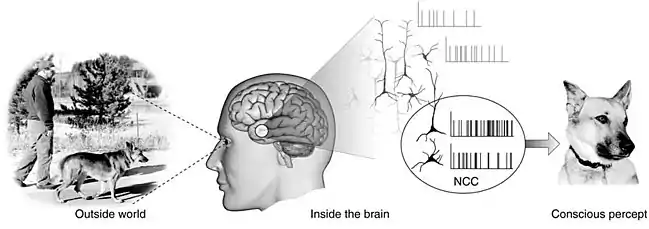| Type classification: this is a lesson resource. |
| Subject Classification: this is a neuroscience resource. |
What is Neuroscience?
Neuroscience is a field devoted to the scientific study of the Nervous system. It is one of the most interdisciplinary scientific fields, and also one of the most rapidly advancing. Neuroscientists may come from a variety of backgrounds, including psychology, computer science, biology, and medicine. It advances the potential understandings of the humanities by offering hypotheses and conceptualizations for the underlying mechanisms of thought, emotion, behavior, and everything in between. Neuroscientists use an ever increasing range of tools, including scanners capable of showing brain activation in real-time, computer models that are capable of acquiring language capabilities using the same basic methodology of developing children, molecular techniques which can explain how changes on an infinitesimally small scale can translate into effects of incalculable gravity, and ethological studies which decode the complex workings and interactions of living creatures in their natural environments into overarching laws of behavior. From these studies they learn how the nervous system arises, comes to shape who we are, and even how it sometimes fails.
Major Questions in Neuroscience
.gif)
How do we learn and remember? What are emotions? How and why does the nervous system malfunction? What can be done to reverse, halt, and/or treat adverse physiological or psychological symptoms that result from these malfunctions? What are the implications of neuroscience on law and morality? What is consciousness?, Can intelligence be improved? Where did language come from? Where does a sense of self come from? Is there free will?
Subfields of Neuroscience
Molecular: Neurochemistry, Cellular Neuroscience, Molecular Neuroscience, Neurobiology
Cognitive: Computational Neuroscience, Cognitive Science, Neuropsychology, Affective Neuroscience
Behavioral Neuroscience: Biological Psychology, Behavioral Genetics/Epigenetics, Experimental Psychology, Learning and Behavior
Medical: Neuroimmunology, Neuropathology, Neuropharmacology, Neuroprosthetics, Neurotoxicology, Psychopharmacology, Neuroimaging
Other: Neurolinguistics, Cultural Neuroscience, Neuroanthropology, Evolutionary Neuroscience, Developmental Neuroscience, Neuroengineering, Neuroinformatics, Paleoneurology, Social Neuroscience, Systems Neuroscience, Brain Machine Interface (BMI), Neuroeconomics
Why Neuroscience?
As the father of Neuroscience Santiago Ramón y Cajal put it, "As long as our brain is a mystery, the universe-which is a reflection of the structure of the brain- will also be a mystery". No other field offers such a profound glimpse into the human experience, and more importantly how that experience can be improved.
